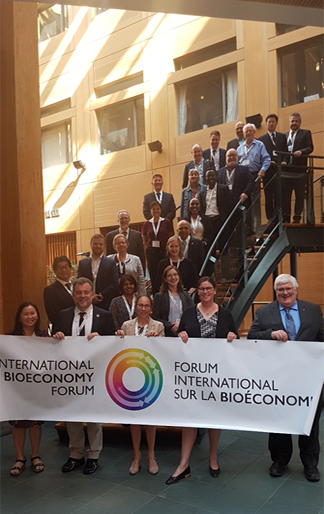Canada co-chairs the International Bioeconomy Forum (IBF) with the European Commission. The IBF provides a flexible multilateral mechanism where global research and innovation partners can discuss, coordinate and act on common challenges in the bioeconomy. The bioeconomy is the production of renewable biological resources and the conversion of these resources and waste streams into value-added products, such as food, feed, bio-based products and bioenergy.
Stay tuned for the next meeting of the IBF working groups.
2nd Plenary Meeting, May 27-28, 2019
Vancouver, Canada
The Second Plenary Meeting of the International Bioeconomy Forum (IBF) was held on May 27 and 28, 2019, at the University of British Columbia (UBC) in Vancouver, Canada. It was hosted by Natural Resources Canada (NRCan) and Agriculture and Agri-food Canada (AAFC), with support by other federal departments (National Research Council of Canada, Fisheries and Oceans Canada, Canadian Food Inspection Agency, and Global Affairs Canada). The meeting was co-chaired by: John Bell, Director, Directorate-General for Research and Innovation, European Commission; Beth MacNeil, Assistant Deputy Minister, Canadian Forest Service, NRCan; and, Gilles Saindon, Associate Assistant Deputy Minister, Science and Technology Branch, AAFC. Around 40 member, observer, and working group representatives attended. The meeting was a success, resulting in tangible progress and a clear path forward.
The two-day program included updates on key governance issues, presentations by all IBF working groups, a poster session highlighting UBC’s bioeconomy research, a networking reception, a visioning exercise, and tours of UBC and the Port of Vancouver.

IBF Plenary participants take a break in the atrium of the Forest Sciences Centre, University of British Columbia.
The IBF supports the development of a sustainable, global bioeconomy
The IBF is a co-owned platform, organized in ad-hoc working groups, to guide international cooperation on key research and innovation priorities and horizontal activities that are crucial for the development of a global, sustainable bioeconomy. The working groups address related global challenges, including under the Paris Agreement on Climate Change and the United Nations Sustainable Development Goals.
The IBF currently has four working groups: Plant Health, Information and Communication Technology in Precision Food Systems, the Forest Bioeconomy, and Microbiome, supported by the MicrobiomeSupport project (funded under Horizon 2020). The working groups bring together expert policy makers, researchers and program developers working in this field to discuss key issues, common challenges, and potential opportunities in the bioeconomy. IBF activities on bioeconomy indicators are led by the Food and Agriculture Organization of the United Nations, in partnership with the European Commission's Joint Research Centre.
Canada and the European Commission would be pleased to welcome new members from countries and organizations with bioeconomy expertise.
For more information, contact Agriculture and Agri-Food Canada’s IBF Sherpa: Sara Sarkar, or the IBF Secretariat hosted by Natural Resources Canada.
IBF Members
- Canada
- European Commission
- New Zealand
- United States of America
- Argentina
- China
- India
- South Africa
Observers
- Australia
- South Korea
- bioeast Initiative
- Food and Agriculture Organization of the United Nations
- Standing Committee on Agricultural Research
- Inter-American Institute for Cooperation on Agriculture